
Custom Search

Custom Search
|


|
These are the latest actual True Ghost Stories that I have uncovered for you,
For more real ghost stories all you have to do is check back to see the latest postings. Follow dddavids GhostCams on... 









|
|
Watch Two of the Latest Real Ghost Stories! Ghostly Tales From Around The World These are real, true ghost stories that I have collected, and put here for your enjoyment. So grab a cup of hot cocoa, and settle in to have a fun night of paranormal reading. I will be adding more from time to time. Check Back! The Ghosts of Castle Bardi 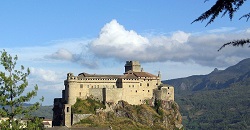
Castle Bardi overlooks the scenic Emilia-Romagna valley in northern Italy. This castle built in the 900s is one of Italy’s medieval treasures. It sits on a jetting outcrop of red jasper. Castle Bardi is known for its Romero and Juliet like tragic love story. It is because of this tragedy that many feel the castle is haunted. 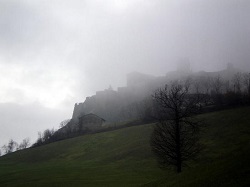
As the story goes... The daughter of the lord of Castle Bardi a young woman by the name of Soleste was in love with the captain of the knights, Moroello. Moroello went off to fight in a long battle. Legend states Soleste ever hopeful for her lovers return would spend many hours perched high atop the castle fortress--her gaze locked on the distant horizon. One day overjoyed she spotted riders galloping back from the battlefield. 
But her joy did not last long for when these riders drew near she saw that they wore the enemies’ colors. Overcome with grief at the thought that Moroello was dead Soleste now filled with despair jumped to her death. But this tale does not end here. It has yet another sad twist. 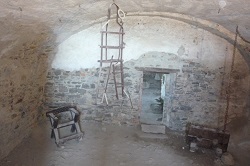
For the riders that Soleste had spotted were Moroello and his men returned. They had donned their enemies’ colors in order to brag of their victory. Tragically, Morello found Soleste’s dead body on the ground. When he realized what he had done he killed himself. 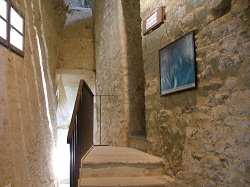
Ever since this time there have been reports that Moroello’s ghost wanders the castle grounds searching for his lost love. The following is a picture that was taken by a parapsychologist in one of the castle’s rooms. It is believed to be Moroello’s ghost. 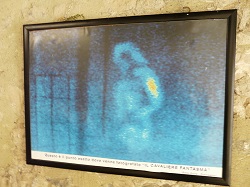
A group of researchers from the center of Parapsychological studies in Bologna said that they had taken photos of a phantom, however, according to some, the photos are of a monk, – yet another poor soul who died in some tragic circumstances here and not the young Soleste. 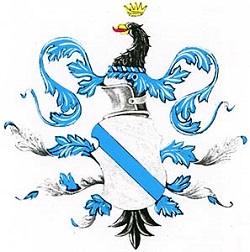
Castle Bardi or Landi Castle--Landi was the family’s surname during Roman times-- has a torture chamber which is near the castle’s old kitchen. Some joke this was to keep the cooks in line. It is said this area is very active to this day. At present not even the last of the old mountain folk who live in those real ghost towns of our area - the hamlets around Bardi like Caneto and Agneto, desolate villages of stone that survive within a spooky neglect - the name 'Barrio' reflects this. Nevertheless amongst the century old legends that surround Bardi, the one about Hannibal's elephant (the last of 37) which died in solitude on the banks of the river Ceno leaving in inheritance a place name of its own, has been the hardest to give into historical truths. It is now known that the Bardi name dates back as far as 600 A.D. when a group of Longobardi fighters, the Arimanni, camped under the cliffs of the blood colored, rocky promontory which dominates the area. In the vicinity was a wood and a river; which was enough to spark up the idea of starting up a village. And the castle? You had to wait a couple of years to pass by and a large piece of the Medieval period too. In the plains the barbarians reigned, raiding and violence were part of everyday life. A bad wind was blowing for the venerable Evarardo, the bishop of Piacenza. What could have been better than looking for escape in a perfectly new castle built up from a steep and unstormable, rocky cliff? And so it was. The terror of the ferocious Ungari raids caused the bishop to buy half of the Bardi fortress which then became subject to various transfers of property. 
Finally, in the middle of the XIII Century, the castle went to the Landi family: from that moment onwards the historical and economical events, not to mention the fortunes of the manor, remained inseparably tied to this Piacentine family which created its own powerful centre for 425 years. It was Ubertino Landi, a dark, wild and indomitable fighter to buy up the castle, half destroyed by the raids of Pallavicino, Lord of Piacenza and to transform it into a fortress. In 1381 Gian galeazzo Visconti gave recognition to the Landi signoria and from 1415 allowed them complete independence: from that year Bardi became the capital of the Landi State, including the territory of the upper Val Ceno and upper Val Taro. Then in the XVI Century, the impressive manor became the principality, due to the wish of the emperor Carlo V. 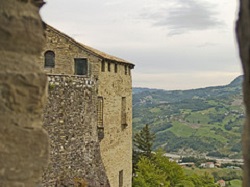
One of the most antique parts of the fortress is the 'mastio', dating back to the 1200's, originally adapted for habitation and then trasformed into a prison. Under the care of the Landi, the castle was transformed from a military fortress to a noble dwelling, through the realisation of elegant appartments, affrescoes, gardens, fountains and a big library. Voices tell the story that the fortress has always been inhabited by a group of nice ghosts. Not even is the horrid chamber of torture missing, where the hangman's axe has been left in full view. Furthermore, recently an antique manuscript has been found, which is proof of the existence of buried treasure in the castle. 
Eltz Castle 
Country: Germany Built: 1157 Haunting: A picturesque castle with one of the richest interiors in all of Deutschland, Eltz rises up out of the surrounding Mosel forest as if boasting its longevity to the surrounding environs. A testament to its strength as a stronghold, Eltz Castle is one of few castles in the region that has never been destroyed. It is also one of just a few German castles that is said to be haunted. Allegedly, the ghosts of medieval knights still patrol the castle, which, 33 generations later, is still owned by the same original family. Imagine living in the same house as your Great X 30 grandmother. Surrounded on three sides by the Elsbach river, and nestled in the Mosel foothills in Germany, Eltz castle looks exactly as you'd imagine a 12th century castle. It's impeccably preserved and 33 generations later is still owned by the same family; who must have a strong disposition as it's said to be roamed by the ghost of Agnes, a previous occupant who died defending her honour from a rather unsuitable suitor. The Shroud A Haunting and True Tale from Russia In a certain village there was a girl who was lazy and slothful, hated working, but would gossip and chatter away like anything! Well, she took it into her head to invite the other girls to a spinning party. For in the villages, as every one knows, it is the lazybones who gives the spinning-feast, and the sweet-toothed are those who go to it. Well, on the appointed night she got her spinners together. They span for her, and she fed them and feasted them. Among other things they chatted about was this -- which of them all was the boldest? Says the lazybones: "I'm not afraid of anything!" "Well then," say the spinners, "if you're not afraid, go past the graveyard to the church, take down the holy picture from the door, and bring it here." "Good, I'll bring it; only each of you must spin me a distaff-full." That was just her sort of notion: to do nothing herself, but to get others to do it for her. Well, she went, took down the picture, and brought it home with her. Her friends all saw that sure enough it was the picture from the church. But the picture had to be taken back again, and it was now the midnight hour. Who was to take it? At length the lazybones said: "You girls go on spinning. I'll take it back myself. I'm not afraid of anything!" So she went and put the picture back in its place. As she was passing the graveyard on her return, she saw a corpse in a white shroud, seated on a tomb. It was a moonlight night; everything was visible. She went up to the corpse, and drew away its shroud from it. The corpse held its peace, not uttering a word; no doubt the time for it to speak had not come yet. Well, she took the shroud and went home. "There!" says she, "I've taken back the picture and put it in its place; and, what's more, here's a shroud I took away from a corpse." Some of the girls were horrified; others didn't believe what she said, and laughed at her. But after they had supped and lain down to sleep, all of a sudden the corpse tapped at the window and said: "Give me my shroud! Give me my shroud!" The girls were so frightened they didn't know whether they were alive or dead. But the lazybones took the shroud, went to the window, opened it, and said: "There, take it." "No," replied the corpse, "restore it to the place you took it from." Just then the cocks suddenly began to crow. The corpse disappeared. Next night, when the spinners had all gone home to their own houses, at the very same hour as before, the corpse came, tapped at the window, and cried: "Give me my shroud!" Well, the girl's father and mother opened the window and offered him his shroud. "No," says he, "let her take it back to the place she took it from." "Really now, how could one go to a graveyard with a corpse? What a horrible idea!" she replied. Just then the cocks crew. The corpse disappeared. Next day the girl's father and mother sent for the priest, told him the whole story, and entreated him to help them in their trouble. "Couldn't a service be performed?" they said. The priest reflected awhile; then he replied: "Please tell her to come to church tomorrow." Next day the lazybones went to church. The service began, numbers of people came to it. But just as they were going to sing the cherubim song, there suddenly arose, goodness knows whence, so terrible a whirlwind that all the congregation fell flat on their faces. And it caught up that girl, and then flung her down on the ground. The girl disappeared from sight; nothing was left of her but her back hair. Source: W. R. S. Ralston, Russian Folk-Tales (London: Smith, Elder and Co., 1873), pp. 307-309. Ralston's source: Aleksandr Afanasyev, v. no. 30a, pp. 140-142. "From the Voroneje Government." Ralston's footnote concerning "her back hair": "The kosa or single braid in which Russian girls wear their hair." A Few Horror Movies That Are Actually True Paranormal/Ghost Stories 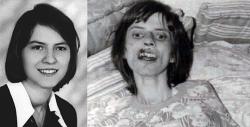
1. The Exorcism of Emily Rose In reality it was Anneliese Michel. Intense shaking and seeming loss of control over her body led doctors to diagnose her with grand mal seizures. However, her behavior progressed to include attacking family members, drinking her own urine and freaking out over religious objects. The family eventually convinced priests to perform multiple exorcisms. Anneliese died in 1976 of pneumonia, before the last exorcism totaling 40, could be performed. There's still debate over whether she was actually possessed. 2. The Haunting in Connecticut The Real Fear team investigates the truth behind this 2009 film based on a true story. In the movie, a family moves to a Connecticut home while their cancer stricken son receives treatment at a nearby hospital. The house is haunted and those spirits get violent. In real life, the family of Carmen Snedeker reported incidents in their Connecticut home during the 1980s. John Zaffis (of Haunted Collector) investigated the case along with Ed and Lorraine Warren. As Lorraine Warren said, the actual case was "much, much scarier than any movie could ever be." 3. The Conjuring In this film paranormal investigators take on a haunted house is based on a true story. The investigators, Ed and Lorraine Warren were very much real and did help a family with their haunted farmhouse. The Warrens also investigated the home that inspired The Amityville Horror. 4. The Girl Next Door The movie details the story of two teenaged girls (orphaned by their parents death) who go to live with their aunt. The woman holds them captive, beating and torturing them. She even lets her children rape them. The film comes from the real life case of Sylvia Likens, who was left with a family friend, Gertrude Baniszewski, while her circus performer parents traveled. Gertrude terrorized Sylvia similar to the events in the film, ultimately leading to Sylvia's death. Prosecutors on the case called it "the most terrible crime ever committed in the state of Indiana." Find more at: Chillertv.com 
Resurrection of the Pamir 21 December, 1957, at 3 a.m., all the vessels which were sailing the Atlantic Ocean received a SOS-signal sent by the German training vessel Pamir: "Strong storm. All sails torn. 45-degree heel. Risk of sinking!" This was the last message sent by the Pamir. This ship disappeared without a trace only to be resurrected later in the form of a ghost-ship. Four years went by. Another training vessel, the Chili Esmeralda, while going through the English Channel, tried to cope with a heavy storm. All of a sudden, there appeared a ship that, despite the rough weather, sailed by as if experiencing no difficulties with the situation. It was the Pamir. After this mysterious encounter, the sea became calm and still, and the Esmeralda made her way to the port of destination safely. Several months later, yachtsman Reed Bierce ran into heavy weather near the Virgin Islands, an archipelago in the Atlantic. According to his description, Reed Bierce also happened to see the Pamir which accompanied him all the way to the port, and when the shore came in sight, she vanished into the thin air. This ghost-ship accompanied other vessels, for example, the Norwegian steamship "Christian Radich", American coastal patrol boat "Eagle", German training vessel the "Gorch Foch". Every time the Pamir materialized near some vessel that got into trouble, all the members of her crew, as if alive, were proudly standing on her deck. The eye-witnesses noticed one curious detail: at first, they saw seventy dead crew members on her ship deck. Next time when she appeared, the number of the personnel reduced. Thus, the seamen of that German ship counted only twenty men. So, maybe, someday the last member of that ghost crew will disappear and then the Flying Dutchman of our century will be finally able to rest in peace. |
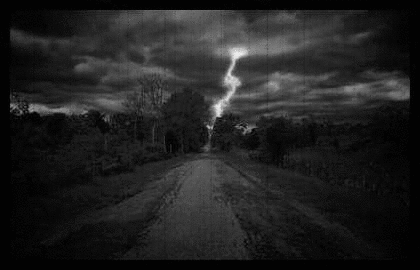
Axe Murder Hollow A Pennsylvania Ghost Story As told by S.E. Schlosser Susan and Ned were driving through a wooded empty section of highway. Lightning flashed, thunder roared, the sky went dark in the torrential downpour. "We had better stop." said Susan. Ned nodded his head in agreement. He stepped on the brake, and suddenly the car started to slide on the slick pavement. They plunged off the road and slid to a halt at the bottom of an incline. Pale and shaking, Ned quickly turned to check if Susan was all right. When she nodded, Ned relaxed and looked through the rain soaked windows. "I'm going to see how bad it is." He told Susan, and when out into the storm. She saw his blurry figure in the headlight, walking around the front of the car. A moment later, he jumped in beside her, soaking wet. "The cars not badly damaged, but we're wheel-deep in mud." He said. "I'm going to have to go for help." Susan swallowed nervously. There would be no quick rescue here. He told her to turn off the headlights and lock the doors until he returned. Axe Murder Hollow. Although Ned hadn't said the name aloud, they both knew what he had been thinking when he told her to lock the car. This was the place where a man had once taken an axe and hacked his wife to death in a jealous rage over an alleged affair. Supposedly, the axe-wielding spirit of the husband continued to haunt this section of the road. Outside the car, Susan heard a shriek, a loud thump, and a strange gurgling noise. But she couldn't see anything in the darkness. Frightened, she shrank down into her seat. She sat in silence for a while, and then she noticed another sound. Bump. Bump. Bump. It was a soft sound, like something being blown by the wind. Suddenly, the car was illuminated by a bright light. An official sounding voice told her to get out of the car. Ned must have found a police officer. Susan unlocked the door and stepped out of the car. As her eyes adjusted to the bright light, she saw it. Hanging by his feet from the tree next to the car was the dead body of Ned. His bloody throat had been cut so deeply that he was nearly decapitated. The wind swung his corpse back and forth so that it thumped against the tree. Bump. Bump. Bump. Susan screamed and ran toward the voice and the light. As she drew close, she realized the light was not coming from a flashlight. Standing there was the glowing figure of a man with a smile on his face and a large, solid, and definitely real axe in his hands. She backed away from the glowing figure until she bumped into the car. "Playing around when my back was turned?" the ghost whispered, stroking the sharp blade of the axe with his fingers. "You've been very naughty." The last thing she saw was the glint of the axe blade in the eerie, incandescent light. |

The Ghosts of Ettington Park Hotel in Stratford upon Avon Ettington Park Hotel has long had a reputation of being a haunted hotel. It was even allegedly named, the most haunted hotel in the UK by the AA. Guests of this hotel, as well as the members who staff it, continue to report seeing various apparitions, phantoms and figures along with hearing ghostly voices with no apparent physical source. There is the old Victorian women, which has been witnessed walking along the conservatory entrance. Many people, both guests and staff, have reported the ghosts of a man and his faithful dog, wandering in the library and then dissipating quickly. It is reported that in the festive period, more precisely, on Christmas Eve, the staff witnessed a candle lift up off the mantelpiece and float, with no physical explanation even being established. Ettington Park's most famous and popular spirit, is that of a women said to dressed in a long white gown. Gliding along the corridors at night time, she is said to frighten many guests and members of the staff, dissipating through walls and reappearing on the veranda. She is believed to be a former governess and is known by the name "Lady Emma". There are also sightings of a monk both inside and outside the hotel, an army officer and the two young Shirley boys who drowned in the 1800s in the Stour River. |
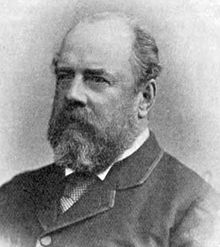
Admiral, Sir George Tryon and his estate 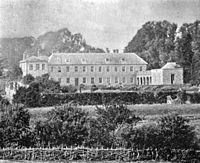
Eaton Place. Belgravia. SW1. The Admiral's Doppleganger On 22nd June 1893, Admiral, Sir George Tryon was on manoeuvres with the Mediterranean Fleet off the coast of Syria. Suddenly he gave orders for his ship the Victoria, and the nearby Camperdown to turn inwards and steam towards each other. It was obvious to all on board that disaster was imminent, but none of his subordinates dared overrule or question Tryon's extraordinary command. In consequence, the two ships collided and the Victoria sank, taking the Admiral and four hundred mariners to a watery grave. As the ship went down Sir George was heard to say. "It is entirely my fault." At more or less the exact moment that Sir George Tryon was plummeting to the ocean bed, his wife was holding an, "At home", in their houses in Eaton Place. Suddenly Sir George, resplendent in full naval regalia, appeared before over a hundred guests, strolled across the room, and vanished. Lady Tryon did not see him herself and was mystified when told by her guests that her husband had just walked through the room. She explained to her guests that he was far away at sea. Next day, however, word reached her of the tragedy and she realised that her guests must have seen her husband's ghost. |